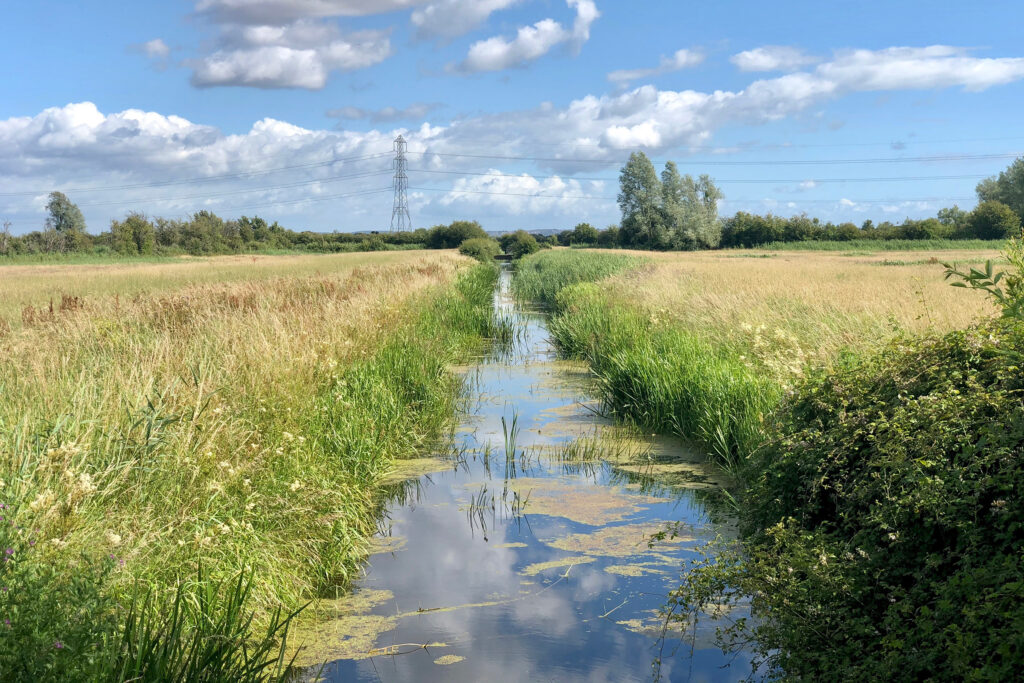The plans for Cardiff Parkway have been over a decade in the making. The proposed station and business park, located in St. Mellons, is part of a long-term strategy intended to bring new industry, business, and green energy schemes to the east of Cardiff.
Potential impacts to Biodiversity
The proposal was granted planning permission at the end of March 2022, with the proposed site located at the edge of the Gwent Levels. There is a network of narrow watercourses, named “reens”, in the area and the plans include conditions to maintain and protect them. In addition, plans include replacing trees cut down with newly planted ones, and to create wildlife corridors.
However, concerns were raised about the wider impact on ecology and wildlife within the area, with proposals containing plans for buildings ranging from 2 to 15 storeys tall. The Rumney and Peterstone Sites of Special Scientific Interest (‘SSSIs’) at Gwent Levels are biodiverse landscapes, packed with reeds and field ditches which host a wide range of plants and wildlife, including some rare species. The reens carry water from the uplands to sea and protect the reclaimed land from flooding.
Policy & Government
As a nationally significant project, the Welsh Government called in the proposal to make the decision themselves. Their appointed inspector, Mr. Thickett, conducted hearings into the proposal in July 2023 and submitted his report to the Welsh Ministers in September. However, ahead of changes to Planning Policy Wales in Edition 12 due to be published soon, in October 2023 Minister for Climate Change Julie James highlighted that environmental and biodiversity measures in Chapter Six of the update Policy were already in effect which include the strengthening of protection for SSSIs, have delayed the development of Cardiff Parkway. In light of the new Policy, and due to the proposal’s potential impact on local SSSI at Rumney and Peterstone, it was decided a new hearing would be opened.
Recent changes to the Policy mean that development in an SSSI is considered unacceptable as a matter of principle, including development not in an SSSI but likely to damage one, and can happen only in “wholly exceptional” circumstances with increased emphasis placed on the position for site management and exemptions for minor development necessary to maintain a “living landscape”. Further, the Policy advocates that new planting should be part of development based on securing the right tree in the right place. In exceptional circumstances, a planned approach can be used where necessary safeguards can be secured through a development plan.
Policy impacts on Cardiff Parkway
The new hearings will examine whether the construction of Cardiff Parkway is “wholly exceptional” when weighted against the potential impact on biodiversity and SSSI. Residents in St Mellons have both supported the new station proposal and echoed concerns about the height of some of the buildings and the impact on local wildlife.
The Cardiff Parkway saga demonstrates the impact local and national policy can have on planning proposals during the period of their development. It is no longer satisfactory for developers to manage impacts on biodiversity, with changes in policy emphasising on the importance of wildlife conservation and improvement. Biodiversity Net Gain in England and the proposed Net Benefit to Biodiversity in Wales represent intentions from government to place an onus on developers to maintain and improve biodiversity throughout the planning process.
Planning policy is constantly evolving. If you would like advice on how planning law and policy might affect you, please contact Tom Jones (t.jones@capitallaw.co.uk).




